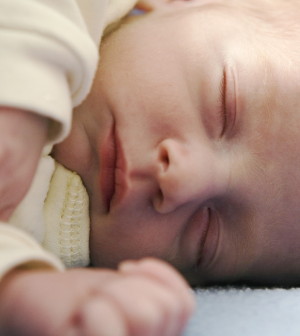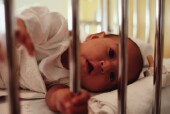- The Best Time of Day to Drink Bone Broth to Maximize Health Benefits
- 8 Ways to Increase Dopamine Naturally
- 7 Best Breads for Maintaining Stable Blood Sugar
- Gelatin vs. Collagen: Which is Best for Skin, Nails, and Joints?
- The Long-Term Effects of Daily Turmeric Supplements on Liver Health
- Could Your Grocery Store Meat Be Causing Recurring UTIs?
- Are You Making This Expensive Thermostat Error This Winter?
- Recognizing the Signs of Hypothyroidism
- 10 Strategies to Overcome Insomnia
- Could Artificial Sweeteners Be Aging the Brain Faster?
Doctors Cautiously Optimistic About ‘Cure’ for HIV-Infected Babies


The hope that newborns can be “cured” of HIV — the virus that causes AIDS — with early, aggressive drug treatment was bolstered this week with the announcement that a second baby appears to be free of the virus following therapy that began just four hours after her birth.
The child, born at Miller Children’s Hospital in Long Beach, Calif., is now 9 months old and is considered HIV-negative, researchers reported Wednesday at the Conference on Retroviruses and Opportunistic Infections in Boston.
The first baby apparently cured by early drug therapy — the so-called “Mississippi baby” — is now more than 3 years old and also remains free of HIV infection, said Dr. Deborah Persaud, an associate professor of pediatrics in the division of infectious diseases at Johns Hopkins Children’s Center in Baltimore.
Persaud, who presented the findings Wednesday on the California baby, has also been involved with continued monitoring of the Mississippi baby.
While the two cases have key differences, taken together they seem to indicate that newborns can be cured of infection with HIV if doctors begin treatment within hours of birth.
A federally funded clinical trial will start within a couple of months to arrive at a more scientific assessment of the treatment, said Dr. Anthony Fauci, director of the U.S. National Institute of Allergy and Infectious Diseases.
In the trial, as many as 60 babies who are born with HIV will be put on an antiretroviral drug regimen within 48 hours of birth.
The results of the trial could change the way doctors treat HIV-infected newborns, altering thinking that up until now has favored caution because these drugs can be extremely toxic.
“You have to get the data from the trial. You don’t want to jump ahead of yourself,” Fauci said. “But data that shows when you treat a baby immediately you can actually cure a baby, that changes the equation of risk/benefit. That makes a doctor lean much more toward immediate treatment.”
More than 1,000 babies are born with HIV every day around the globe, according to UNICEF.
The mother of the California baby has advanced AIDS and is mentally ill, researchers said. She had been prescribed HIV medications to protect her baby, but had not taken them, according to published reports.
Normally, doctors put children born to HIV-positive mothers on a two-medication regimen until the virus appears in the babies’ bloodstream, which can take as long as two weeks. At that point, they move to a more aggressive three-drug regimen.
But in the cases of the Mississippi and California babies, doctors chose to quickly put the newborns on the more aggressive regimen, with stunning results.
Fauci noted that doctors can’t yet call the California baby “cured” of HIV infection because she remains on the antiretroviral drug therapy.
“The proof of the pudding is when you take the baby off therapy, and the virus does not bounce back,” he said.
The Mississippi baby provides a more striking case because doctors lost track of the mother and child 18 months after her birth, at which point drug therapy ceased. Doctors next saw the child about 10 months later, and were surprised when they found that the girl remained HIV-free despite receiving no further treatment.
“You can say with a much higher degree of confidence that the Mississippi baby is definitely cured,” Fauci said.
The timing and the heavy medication dose apparently may have prevented HIV from gaining a foothold in the infants’ immune systems, said Dr. Roberto Posada, an associate professor of pediatric infectious diseases at the Icahn School of Medicine at Mount Sinai, in New York City.
HIV typically creates a reservoir in the bodies of those it infects, where it can lay dormant and later return when drug therapy is suspended.
Because adults often don’t find out they have been infected until months or years later, it’s unlikely that the successful treatment of these babies would have any implications for adult HIV therapy, Posada noted.
“It’s difficult to extrapolate these results to adults because babies are so different from adults,” he said. “Their immune systems are at a different stage of development, and you know exactly when they have been infected with HIV — at birth.”
At the same time, these findings do emphasize the importance of treating HIV in adults as early as possible, Fauci said.
More information
For more on HIV infection of newborns, visit the U.S. Centers for Disease Control and Prevention.
Source: HealthDay
Copyright © 2026 HealthDay. All rights reserved.










